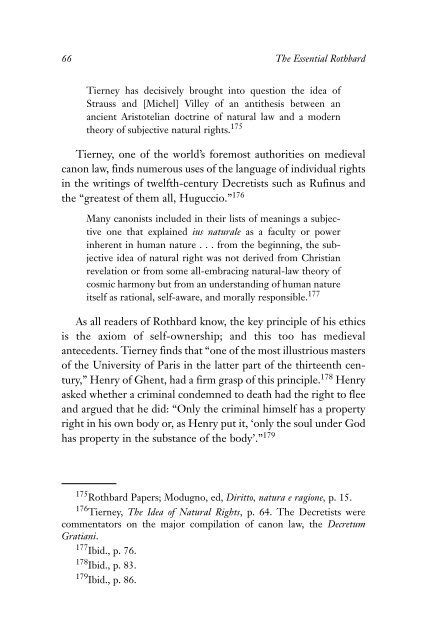The Essential Rothbard - Ludwig von Mises Institute
The Essential Rothbard - Ludwig von Mises Institute
The Essential Rothbard - Ludwig von Mises Institute
Create successful ePaper yourself
Turn your PDF publications into a flip-book with our unique Google optimized e-Paper software.
66 <strong>The</strong> <strong>Essential</strong> <strong>Rothbard</strong><br />
Tierney has decisively brought into question the idea of<br />
Strauss and [Michel] Villey of an antithesis between an<br />
ancient Aristotelian doctrine of natural law and a modern<br />
theory of subjective natural rights. 175<br />
Tierney, one of the world’s foremost authorities on medieval<br />
canon law, finds numerous uses of the language of individual rights<br />
in the writings of twelfth-century Decretists such as Rufinus and<br />
the “greatest of them all, Huguccio.” 176<br />
Many canonists included in their lists of meanings a subjective<br />
one that explained ius naturale as a faculty or power<br />
inherent in human nature . . . from the beginning, the subjective<br />
idea of natural right was not derived from Christian<br />
revelation or from some all-embracing natural-law theory of<br />
cosmic harmony but from an understanding of human nature<br />
itself as rational, self-aware, and morally responsible. 177<br />
As all readers of <strong>Rothbard</strong> know, the key principle of his ethics<br />
is the axiom of self-ownership; and this too has medieval<br />
antecedents. Tierney finds that “one of the most illustrious masters<br />
of the University of Paris in the latter part of the thirteenth century,”<br />
Henry of Ghent, had a firm grasp of this principle. 178 Henry<br />
asked whether a criminal condemned to death had the right to flee<br />
and argued that he did: “Only the criminal himself has a property<br />
right in his own body or, as Henry put it, ‘only the soul under God<br />
has property in the substance of the body’.” 179<br />
175 <strong>Rothbard</strong> Papers; Modugno, ed, Diritto, natura e ragione, p. 15.<br />
176 Tierney, <strong>The</strong> Idea of Natural Rights, p. 64. <strong>The</strong> Decretists were<br />
commentators on the major compilation of canon law, the Decretum<br />
Gratiani.<br />
177 Ibid., p. 76.<br />
178 Ibid., p. 83.<br />
179 Ibid., p. 86.

















